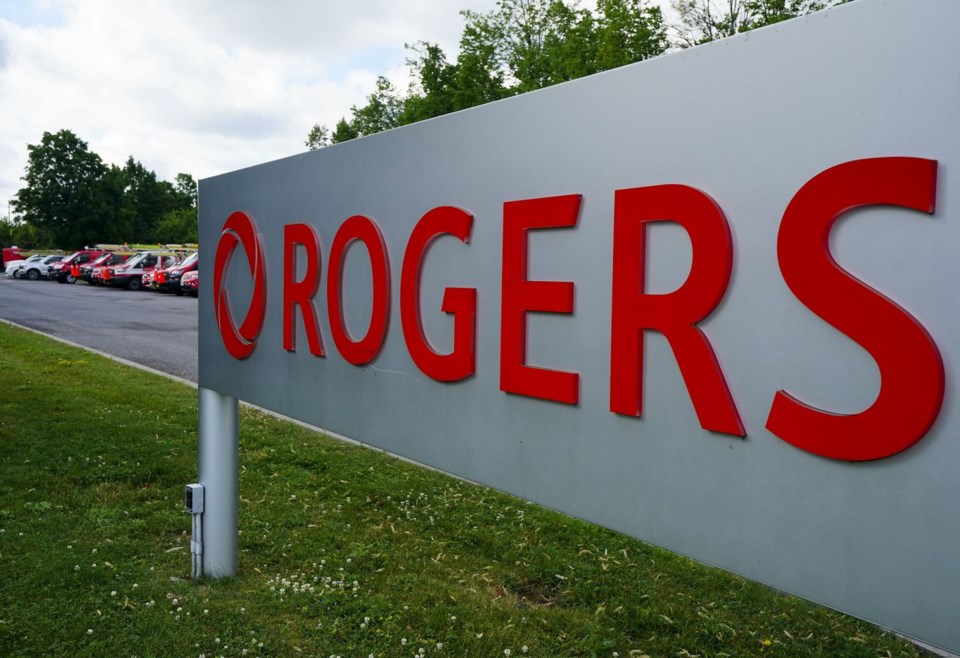TORONTO — Rogers Communications Inc. has launched a new satellite-to-mobile text messaging service, marking the latest step in its partnership with SpaceX and Lynk Global to eventually deliver full satellite-to-phone coverage across apps, data and voice service.
The company said its Rogers Satellite text service, which also includes text-to-911 capability, is available to all Canadians regardless of their mobile carrier, through a free beta trial that will run until October.
The technology uses SpaceX’s Starlink low-earth orbit satellites and Rogers' national wireless spectrum to automatically connect cellphones in areas without cell service. Rogers said the satellites act like cell towers in space, providing a connection if there’s a clear view of the sky.
It's meant to help customers stay connected in some of the most remote parts of Canada and along rural highways.
A coverage map posted online by the company shows its satellite service is available in Canada south of the 58th parallel — near the border of the three territories — excluding specific regions, "in most outdoor areas where you can see the sky." It cautions that satellite service, including text-to-911, may sometimes be delayed, limited or unavailable.
The partnership with Elon Musk's SpaceX and Virginia-based Lynk was originally announced in April 2023.
By December of that year, Rogers said it had passed a key milestone by completing a test call using Lynk’s low-earth orbit satellites and its own wireless spectrum.
Rogers president and CEO Tony Staffieri said Tuesday's announcement "represents the next big leap in wireless connectivity."
"We’re proud to introduce this ground-breaking technology to help Canadians stay safe and connected in more places," Staffieri said in a press release.
The announcement also included positive feedback from organizations such as the BC Search and Rescue Association, the Search and Rescue Association of Alberta, and the Northwestern Ontario Municipal Association.
"Rogers Satellite is a game changer for public safety in Alberta," said Brian Carriere, president of the Alberta group, in the press release.
"This advancement improves our ability to respond faster and more effectively, ultimately saving lives and enhancing the safety of both the public and our SAR volunteers."
Rogers said it plans to continue to test and optimize Rogers Satellite services throughout the beta trial.
Following the trial, Rogers Satellite will be included at no additional cost to customers on the Rogers Ultimate plan — currently priced at $85 per month — and will be available to others for $15 per month.
Customers participating in the beta trial will receive a monthly $5 discount for one year.
Telecommunications industry watchers have touted satellite connectivity as a potential solution for solving resiliency challenges, improving rural and remote connectivity, and increasing competition in the sector.
In June 2024, the federal government launched a consultation into the expansion of wireless services through satellite technology, with then-industry minister François-Philippe Champagne hailing it as “the next frontier where Canadians will be able to use their current phone ... to have absolute connectivity.”
Champagne also said in an interview at the time that with natural disasters on the rise, satellite connections could serve as a backup when traditional networks go down due to power outages.
Other Canadian carriers have been working to develop similar services. Telus Corp. said it successfully trialled mobile-to-satellite technology in late 2023 in partnership with Montreal-based telecom provider TerreStar Solutions Inc. and non-terrestrial network service provider Skylo.
In September 2024, the federal government announced a $2.14-billion loan to satellite operator Telesat to help that company build its broadband satellite constellation, called Lightspeed.
The government said Lightspeed would enable people in the most remote parts of the country, including in Indigenous communities, mines and forestry companies, to access cheaper, more reliable internet.
This report by The Canadian Press was first published July 15, 2025.
Companies in this story: (TSX:RCI.B)
Sammy Hudes, The Canadian Press




